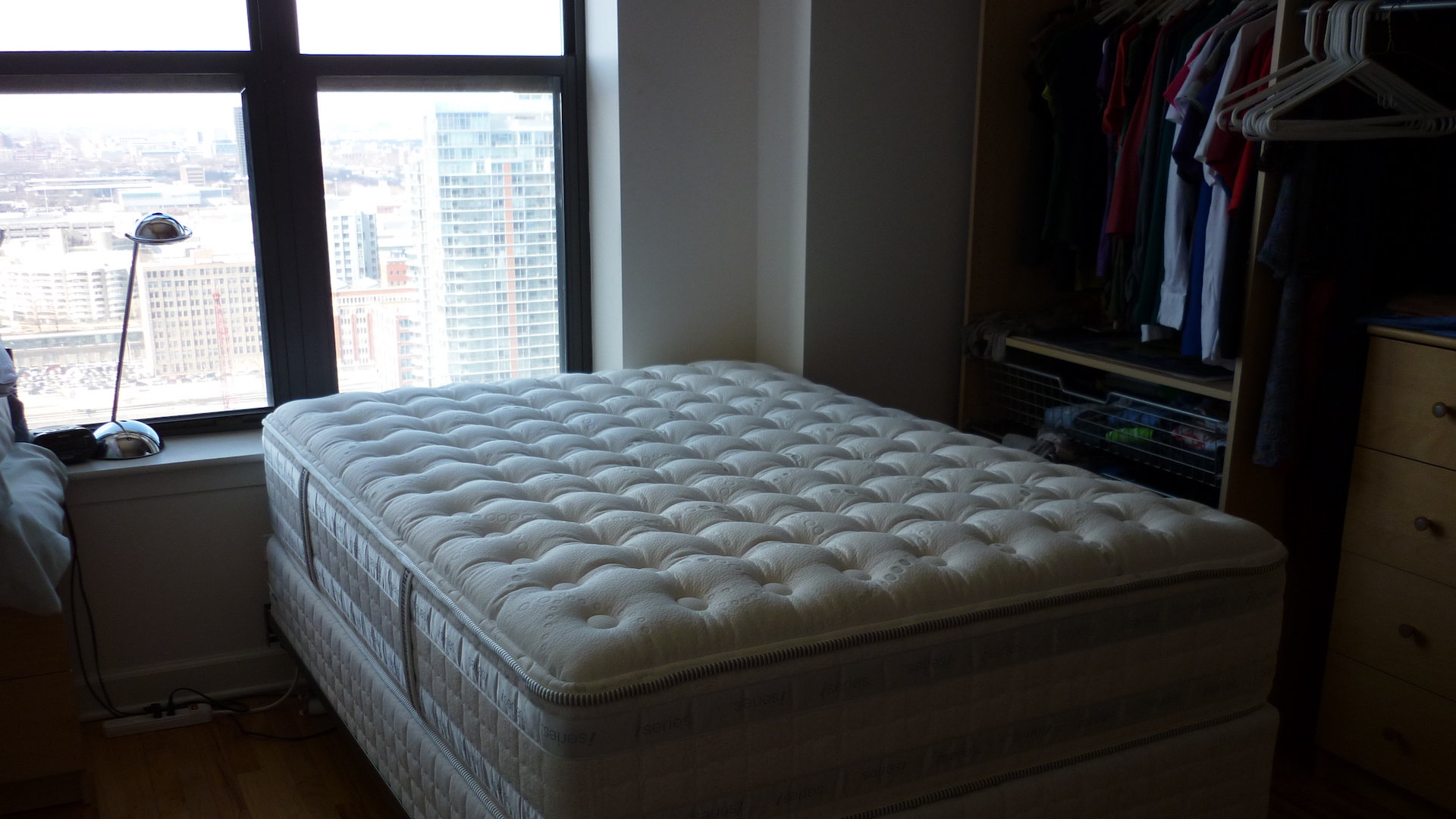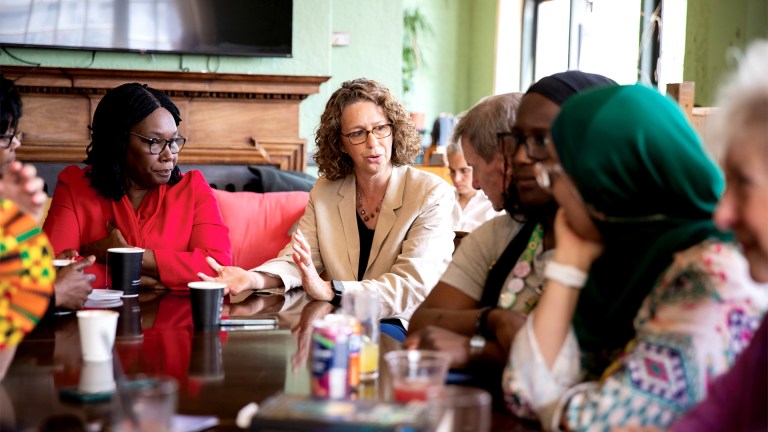All proceeds will go to the operation of food banks, computer recycling, and a newly found debt advice service.
In West London, Trinity Homeless Projects runs charity furniture collections to stock its stores, with proceeds going towards its work ending homelessness.
Sue Ryder
Sue Ryder provides palliative care and aid to those living with a terminal illness alongside providing bereavement support to those in need. The charity will rehome all furniture except white goods as long as the furnishings are in re-saleable condition. To find out if you will be able to receive a pickup, call their national furniture line on 0333 0031883.
Salvation Army
Most Salvation Army shops will take small portable furniture items however, for the larger items such as sofas and beds, specialist furniture shops operate in the Luton and Glasgow areas. Both shops have volunteers willing to come and collect larger donations within the next day. Staff at these specialist branches see to it that your larger furniture can be easily rehomed to people who need it as they move into new housing.
Shelter
The homeless charity Shelter offers offers a free partial house clearance and will collect most good quality items for free as long as pickup falls within 25 miles of one of their branches. While they primarily raise money for their services through their charity shops, some donated furniture may be used to support individuals and families in emergency housing or transitioning to new homes. Donating to Shelter ensures that your furniture helps fund vital support for people facing homelessness, as well as providing practical assistance in some cases.
Cancer Research UK
Another of the UK’s most recognisable charities, Cancer Research UK offers unwanted furniture collections. You can find out more details and request a collection here, but keep in mind that they cannot accept items which cannot be sold. The charity accepts like sofas, tables and wardrobes as long as they’re in good condition.
Advertising helps fund Big Issue’s mission to end poverty
British Red Cross
A number of British Red Cross charity shops will operate furniture collections, but the charity recommends calling your local brand to see if they are able to do so. This is in part because availability of collection services can vary depending on location, so it’s best to check in advance what items they accept and if a free pickup can be arranged.
British Red Cross shops generally accept good quality furniture, and these donations are often passed directly to those in need or sold to fund the charity’s humanitarian work, both locally and abroad.
What should I donate to charities that collect furniture?
There are charities that collect furniture across the country who are willing to take anything in good condition. From cutlery and crockery through to white goods and larger items such as sofas and couches. Beds and clean mattresses are always in high demand.
It’s important not to waste both your time and the charity’s time with goods that have been damaged that cannot be re-used or resold. Look out for items that have been sun damaged or bleached, heavily scratched beyond repair or require being completely broken apart to be removed from the house.
Can I donate a sofa without a fire label?
No. It’s illegal for charities to sell upholstered furniture without the correct fire label – so make sure your sofa has one. Other upholstered furniture you might be donating includes lounge chairs and armchairs, and some beds, all of which will need fire labels to be sold.
To find the fire label, search on the external surfaces of the sofa, such as on the bottom or under cushions. It should be firmly attached.
Advertising helps fund Big Issue’s mission to end poverty
Why should I donate?
Not only will arranging a furniture donation help provide a helping hand to those in need but you will be taking steps against climate change.
The British Heart Foundation (BHF) – one of the main charities that collect furniture – saves 71,000 tonnes of items going to waste a year, including 180,000 sofas. By avoiding the landfills BHF estimates that they have been able to save 135,000 tonnes of CO2 emissions being released into the atmosphere.
Where can I donate furniture to homeless people?
When people at risk of homelessness are helped into housing, that’s only part of the battle – making a house a home can still be tricky, and it’s always expensive. By arranging a free unwanted furniture collection you could help someone who, like all of us, deserves more than just four walls and a roof.
Get the latest news and insight into how the magazine is made by signing up for the Inside Big Issue newsletter
To donate furniture that directly benefits people facing homelessness, there are a number of homeless charities in the UK that use donations to furnish shelters and temporary accommodation, or help people moving into new housing. Your unwanted furniture can make an immediate impact.
Emmaus
Emmaus supports people who have experienced homelessness by providing them with a home, meaningful work and access to a supportive community. They use donated furniture to get accommodation ready for people who are transitioning out of homelessness and getting settled on their residential sites. They accept large furniture items and offer a collection service for donations in most areas.
Advertising helps fund Big Issue’s mission to end poverty
St Mungo’s
St Mungo’s is one of the largest homelessness charities in the UK, helping people in need with emergency accommodation and tailored support. This ranges from shelters and hostels to supported housing – all of which need to be comfortably furnished.
They can only accept new furniture and soft furnishings, but if you have something you think might be suitable and want to know if it fits the organisation’s needs then contact supportercare@mungos.org for more information.
Local homeless shelters
Many local shelters and housing associations rely on unwanted furniture donation to equip temporary accommodation or help homeless people settle into new homes. Shelters could require anything from beds and sofas to tables and storage units. To donate, it’s best to contact local shelters directly to ask what items they need. Organisations like Housing Justice or Homeless Link might be able to help you find a shelter most in need of your items.
A reuse centre near you
Reuse centres across the country are tackling poverty, cutting waste and helping people improve their lives. By matching people with furniture (and other items you might have handy!) with organisations or individuals in need, fewer people are having to buy new and less waste is ending up in landfills. Check online to find the reuse centre nearest you.
Local councils
Local authorities, with budgets cut to the bone after over a decade of austerity, tend to be on the look out for cheap ways to help the people they support. And in many cases, that means gathering generous donations from the community to help furnish new homes. Contact your local council’s housing or social services department for details on how to donate or connect you with those who can use the items.
Do you have a story to tell or opinions to share about this? Get in touch and tell us more. Big Issue exists to give homeless and marginalised people the opportunity to earn an income. To support our work buy a copy of the magazine or get the app from the App Store or Google Play.
Advertising helps fund Big Issue’s mission to end poverty









